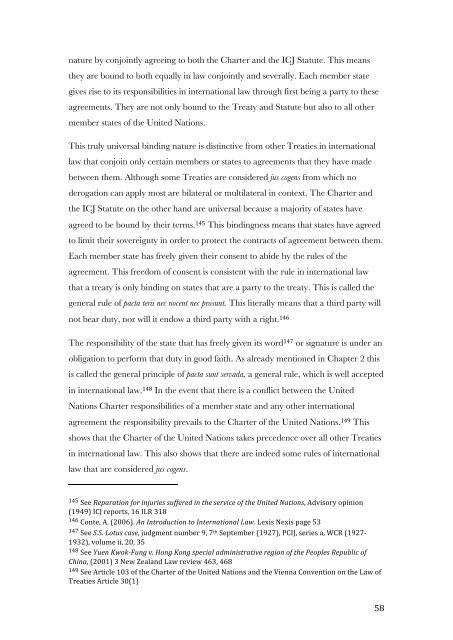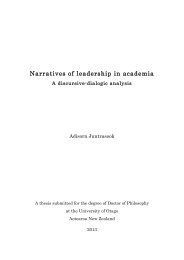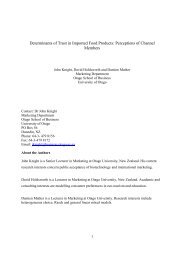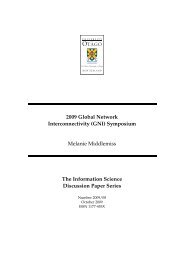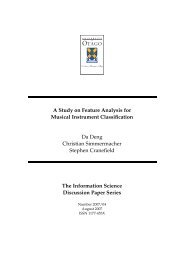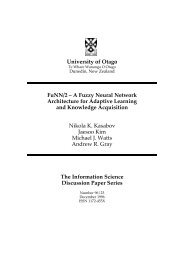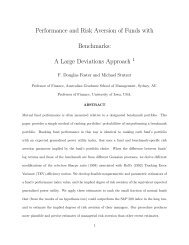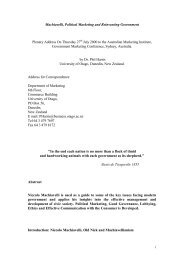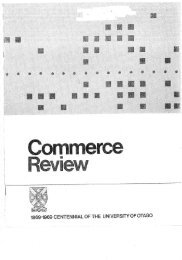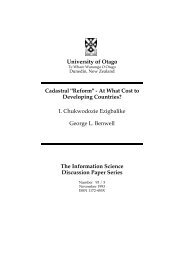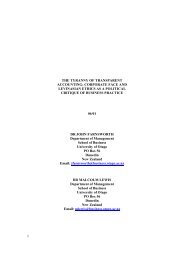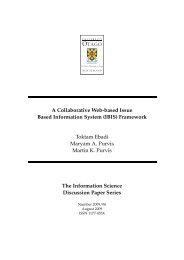Where is R2P grounded in international law? Anne-Marie Judson A ...
Where is R2P grounded in international law? Anne-Marie Judson A ...
Where is R2P grounded in international law? Anne-Marie Judson A ...
Create successful ePaper yourself
Turn your PDF publications into a flip-book with our unique Google optimized e-Paper software.
nature by conjo<strong>in</strong>tly agree<strong>in</strong>g to both the Charter and the ICJ Statute. Th<strong>is</strong> means<br />
they are bound to both equally <strong>in</strong> <strong>law</strong> conjo<strong>in</strong>tly and severally. Each member state<br />
gives r<strong>is</strong>e to its responsibilities <strong>in</strong> <strong>in</strong>ternational <strong>law</strong> through first be<strong>in</strong>g a party to these<br />
agreements. They are not only bound to the Treaty and Statute but also to all other<br />
member states of the United Nations.<br />
Th<strong>is</strong> truly universal b<strong>in</strong>d<strong>in</strong>g nature <strong>is</strong> d<strong>is</strong>t<strong>in</strong>ctive from other Treaties <strong>in</strong> <strong>in</strong>ternational<br />
<strong>law</strong> that conjo<strong>in</strong> only certa<strong>in</strong> members or states to agreements that they have made<br />
between them. Although some Treaties are considered jus cogens from which no<br />
derogation can apply most are bilateral or multilateral <strong>in</strong> context. The Charter and<br />
the ICJ Statute on the other hand are universal because a majority of states have<br />
agreed to be bound by their terms. 145 Th<strong>is</strong> b<strong>in</strong>d<strong>in</strong>gness means that states have agreed<br />
to limit their sovereignty <strong>in</strong> order to protect the contracts of agreement between them.<br />
Each member state has freely given their consent to abide by the rules of the<br />
agreement. Th<strong>is</strong> freedom of consent <strong>is</strong> cons<strong>is</strong>tent with the rule <strong>in</strong> <strong>in</strong>ternational <strong>law</strong><br />
that a treaty <strong>is</strong> only b<strong>in</strong>d<strong>in</strong>g on states that are a party to the treaty. Th<strong>is</strong> <strong>is</strong> called the<br />
general rule of pacta terii nec nocent nec prosunt. Th<strong>is</strong> literally means that a third party will<br />
not bear duty, nor will it endow a third party with a right. 146<br />
The responsibility of the state that has freely given its word 147 or signature <strong>is</strong> under an<br />
obligation to perform that duty <strong>in</strong> good faith. As already mentioned <strong>in</strong> Chapter 2 th<strong>is</strong><br />
<strong>is</strong> called the general pr<strong>in</strong>ciple of pacta sunt servada, a general rule, which <strong>is</strong> well accepted<br />
<strong>in</strong> <strong>in</strong>ternational <strong>law</strong>. 148 In the event that there <strong>is</strong> a conflict between the United<br />
Nations Charter responsibilities of a member state and any other <strong>in</strong>ternational<br />
agreement the responsibility prevails to the Charter of the United Nations. 149 Th<strong>is</strong><br />
shows that the Charter of the United Nations takes precedence over all other Treaties<br />
<strong>in</strong> <strong>in</strong>ternational <strong>law</strong>. Th<strong>is</strong> also shows that there are <strong>in</strong>deed some rules of <strong>in</strong>ternational<br />
<strong>law</strong> that are considered jus cogens.<br />
145 See Reparation for <strong>in</strong>juries suffered <strong>in</strong> the service of the United Nations, Adv<strong>is</strong>ory op<strong>in</strong>ion <br />
(1949) ICJ reports, 16 ILR 318 <br />
146 Conte, A. (2006). An Introduction to International Law. Lex<strong>is</strong> Nex<strong>is</strong> page 53 <br />
147 See S.S. Lotus case, judgment number 9, 7 th September (1927), PCIJ, series a, WCR (1927-‐<br />
1932), volume ii, 20, 35 <br />
148 See Yuen Kwok-Fung v. Hong Kong special adm<strong>in</strong><strong>is</strong>trative region of the Peoples Republic of <br />
Ch<strong>in</strong>a, (2001) 3 New Zealand Law review 463, 468 <br />
149 See Article 103 of the Charter of the United Nations and the Vienna Convention on the Law of <br />
Treaties Article 30(1) <br />
<br />
58


